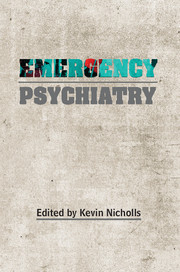Book contents
- Frontmatter
- Contents
- List of contributors
- Acknowledgements
- Preface
- 1 Assessment of suicide risk
- 2 Violence and aggression
- 3 Substance misuse emergencies
- 4 Alcohol and psychiatric emergencies
- 5 Acute psychosis
- 6 Acute side-effects of psychotropic medication
- 7 Emergencies in child and adolescent psychiatry
- 8 The psychiatric intensive care unit
- 9 Safeguarding
- 10 Emergency electroconvulsive therapy
- 11 Life-threatening medical emergencies in a mental health unit
- 12 Emergencies in intellectual disability psychiatry
- 13 Emergencies in older persons’ psychiatry
- 14 Perinatal psychiatric emergencies
- 15 Civilian and military psychological trauma
- 16 Emergencies in liaison psychiatry
- 17 Psychiatric emergencies in deaf people
- 18 Mental health law
- 19 Self-poisoning: aspects of assessment and initial care
- Index
15 - Civilian and military psychological trauma
Published online by Cambridge University Press: 01 January 2018
- Frontmatter
- Contents
- List of contributors
- Acknowledgements
- Preface
- 1 Assessment of suicide risk
- 2 Violence and aggression
- 3 Substance misuse emergencies
- 4 Alcohol and psychiatric emergencies
- 5 Acute psychosis
- 6 Acute side-effects of psychotropic medication
- 7 Emergencies in child and adolescent psychiatry
- 8 The psychiatric intensive care unit
- 9 Safeguarding
- 10 Emergency electroconvulsive therapy
- 11 Life-threatening medical emergencies in a mental health unit
- 12 Emergencies in intellectual disability psychiatry
- 13 Emergencies in older persons’ psychiatry
- 14 Perinatal psychiatric emergencies
- 15 Civilian and military psychological trauma
- 16 Emergencies in liaison psychiatry
- 17 Psychiatric emergencies in deaf people
- 18 Mental health law
- 19 Self-poisoning: aspects of assessment and initial care
- Index
Summary
Traumatic events are inevitably associated with high-profile accidents and disasters, the military and the ‘horrors of war’. However, most trauma goes unseen and unreported within abusive families, following sexual assault and following accidents. Indeed, more than 60% of us suffer potentially traumatising events at some point in our lives (Green, 1994). Many get over their experience and emerge unscathed or even emotionally stronger from their experience. For those who go on to suffer long-term mental health problems, however, the aftermath is often undetected, untreated and, in the case of accident victims, can be more disabling than any physical injury. Physical injuries are visible and these can mask and deflect attention from psychological symptoms, increasing the likelihood of longterm psychological disorder. After road traffic accidents, for example, more than 20% of patients attending the emergency department go on to suffer post-traumatic stress disorder (PTSD; Blanchard & Hickling, 2004), which can be a social handicap and persist for years, despite having made a satisfactory physical recovery. Trauma-related mental health problems are also often mistaken for substance misuse issues or an emotionally unstable personality disorder. Members of the emergency services and clinical staff involved in the management of trauma are themselves at risk and it is particularly important that these groups have access to highquality supervision and work in an environment where they feel they can talk candidly about the emotional effects of their work. This chapter will consider reactions to traumatic events affecting individuals and groups following disasters and during military conflict, as well as appropriate therapeutic interventions.
Traumatic events
There are two forms of traumatic event: type 1 is a single, ‘out of the blue’ incident (e.g. an assault or road traffic accident); type 2 is a repeated, ongoing or sustained trauma (e.g. childhood sexual abuse, repeated traumatic events in conflict). Unfortunately, much of the evidence base supporting treatments in the management of trauma is based on type 1 samples (where it is easier to define a homogeneous patient sample). Moreover, many treatment studies specifically exclude patients with comorbidity (often the norm) or other confounding factors, such as alcohol misuse or ongoing litigation (sadly, also common in clinical settings).
- Type
- Chapter
- Information
- Emergency Psychiatry , pp. 249 - 264Publisher: Royal College of PsychiatristsPrint publication year: 2015

